- Home
- Jojo Moyes
After You Page 26
After You Read online
Page 26
my apology and sat down. “Oh, and we only have an hour today because of an emergency meeting of the Scouts. Sorry about that, guys.”
Marc fixed each of us with his Special Empathetic Gaze. He was very keen on his Special Empathetic Gaze. Sometimes he would stare at me for so long I wondered if something was poking out of my nostril. He looked down, as if gathering his thoughts—or perhaps studying his opening lines from a prepared script.
“When someone we love is snatched from us, it often feels very hard to make plans. Sometimes people feel like they have lost faith in the future, or they become superstitious.”
“I thought I was going to die,” said Natasha.
“You are,” said William.
“Not helpful, William,” said Marc.
“No—honestly, for the first eighteen months after Olaf died, I thought I had cancer. I think I went to the doctor about a dozen times convinced I was getting cancer. Brain tumors, pancreatic cancer, womb cancer, even little-finger cancer.”
“There’s no such thing as little-finger cancer,” said William.
“Oh, how would you know?” snapped Natasha. “You have a smart answer for everything, William, but sometimes you should just keep your mouth shut, okay? It gets very tedious having you make a snarky comment about everything that someone says in this group. I thought I had little-finger cancer. My GP looked at it and sent me for tests and it turned out I didn’t. It might have been an irrational fear, yes, but you don’t have to put down everything I say because, whatever you think, you don’t know everything, okay?”
There was a brief silence.
“Actually,” said William. “I work on an oncology ward.”
“It still stands,” she said, after a microsecond. “You are insufferable. A deliberate agitator. A pain in the backside.”
“That’s true,” said William.
Natasha stared at the floor. Or perhaps we all did. It was hard to tell, given I was staring at the floor. She put her face into her hands for a moment, then looked up at him.
“You’re not really, William. I’m sorry. I think I’m just having one of those days. I didn’t mean to snap at you like that.”
“Still can’t get little-finger cancer, though,” said William.
“So . . .” said Marc, as we tried to ignore the sound of Natasha cursing repeatedly under her breath. “. . . I’m wondering whether any of you have reached a point where you can consider the prospect of life five years on. Where do you see yourself? What do you see yourself doing? Do you feel okay to imagine the future now?”
“I’ll be happy if my old ticker’s still ticking,” said Fred.
“All that Internet sex putting it under strain?” said Sunil.
“That!” Fred exclaimed. “That was a total waste of money. The first site I spent two weeks e-mailing this woman from Lisbon—total cracker—and when I finally suggested we meet up for a bit of the old how’s-your-father, she tried to sell me a condo in Florida. And then a man called Buffed Adonis private-messaged me to warn me off and tell me she was actually a one-legged Puerto Rican fella called Ramirez.”
“What about the other sites, Fred?”
“The only woman who said she’d meet me looked like my great-aunt Elsie, who kept her keys in her knickers. I mean, she was very sweet and all, but the old girl was so ancient I was almost tempted to check.”
“Don’t give up, Fred,” said Marc. “It might be that you’re looking in the wrong places.”
“For my keys? Oh, no. I hang those by the door.”
Daphne decided she’d like to retire abroad in the next few years—“It’s the cold here. Gets into my joints.” Leanne said she hoped to finish her philosophy master’s. We gave each other the kind of deliberately blank looks you do when nobody wants to admit they had actually assumed she worked in a supermarket. Or maybe a slaughterhouse. William said, “Well, you Kant.” Nobody laughed, and when he realized nobody was going to, he sat back in his chair, and it might have been only me who heard Natasha muttering, “Hah hah,” like Nelson in The Simpsons.
At first, Sunil didn’t want to speak, then he said he’d thought about it and he’d decided that in five years’ time he’d like to be married. “I feel like I’ve turned myself off for the past two years. Like I wouldn’t let anyone get close to me because of what happened. I mean, what’s the point of getting close to someone if you’re only going to lose them? But the other day I started thinking about what I actually want out of life and I realized it was someone to love. Because you got to move on, right? You got to see some kind of future.”
It was the most I had heard him speak in any meeting since I had started coming.
“That’s very positive, Sunil,” said Marc. “Thank you for sharing.”
I listened to Jake talk about going to college, and how he wanted to study animation, and I wondered absently where his father would be. Still weeping over his dead wife or happily ensconced with some newer version? I suspected the latter. Then I thought about Sam and wondered whether my offhand reference to a relationship had been wise. Then I wondered what we were in if it wasn’t a relationship. Because there were relationships and there were relationships. And even as I mulled this over I realized that if he asked, I wasn’t sure which category we even fit into. I couldn’t help wondering whether the intensity of our search for Lily had acted as a kind of cheap glue, binding us together too quickly. What did we even have in common, other than a fall from a building?
Two days previously I had gone to the ambulance station to wait for Sam, and Donna had stood by her car, chatting with me for a few minutes while he gathered his belongings. “Don’t mess him around.”
I turned, not sure if I had heard her correctly.
She had watched as an ambulance was unloaded by the shutters, and then rubbed her nose. “He’s all right. For a great lunk. And he really likes you.”
I hadn’t known what to say.
“He does. He’s been talking about you. And he doesn’t talk about anyone. Don’t tell him I said anything. I just . . . he’s all right. I just want you to know.” She had raised her eyebrows at me then, and nodded, as if confirming something to herself.
“I just realized you’re not in your dancing-girl outfit,” said Daphne.
There was a murmur of recognition.
“Did you get promoted?”
I was dragged from my thoughts. “Oh. No. I got fired.”
“Where are you working now?”
“Nowhere. Yet.”
“But your outfit . . .”
I was wearing my little black dress with the white collar. “Oh. This. It’s just a dress.”
“I thought you were working at a themed bar for secretaries. Or maybe French maids.”
“Don’t you ever stop, Fred?”
“You don’t understand. At my age, the phrase ‘Use it or lose it’ takes on a certain urgency. I might only have twenty or so stiffies left in me.”
“Some of us have never had twenty stiffies in us in the first place.”
We paused to give Fred and Daphne time to stop giggling.
“And your future? It sounds like it’s all change for you,” said Marc.
“Well . . . I actually got offered another job.”
“You did?” There was a little ripple of applause, which made me blush.
“Oh, I’m not going to take it, but it’s fine. I feel I’ve sort of moved on, just by being offered a job.”
William said, “So what was the job?”
“Just something in New York.”
They all stared at me.
“You got a job offer in New York?”
“Yes.”
“A paid job?”
“With accommodation,” I said quietly.
“And you wouldn’t have to wear that god-awful shiny green dress?”
“I hardly think my outfit was a good enough reason to emigrate.” I laughed. Nobody else did. “Oh come on,” I said.
They were all still
staring at me. Leanne’s mouth might actually have been hanging open a little.
“New York New York?”
“You don’t know the whole story. I can’t go now. I have Lily to sort out.”
“The daughter of your ex-employer.” Jake was frowning at me.
“Well, he was more than my employer. But, yes.”
“Does she have no family of her own, Louisa?” Daphne leaned forward.
“It’s complicated.”
They all looked at each other.
Finally Marc put his pad down on his lap. “How much do you feel you’ve really learned from these sessions, Louisa?”
• • •
I had received the package from New York: a bundle of documents, with immigration and health-insurance forms, clipped together with a thick piece of cream notepaper on which Mr. Leonard M. Gopnik forwarded me a formal offer to work for his family. I had locked myself in the bathroom to read it, then read it a second time, converted the salary to pounds, sighed for a bit, and promised myself I would not Google the address.
After I’d Googled the address I resisted the brief urge to lie on the floor in a fetal position. Then I got a grip, stood up, flushed the loo (in case Lily wondered what I was doing there), washed my hands (out of habit), and took it all into my bedroom, where I stuffed it in the drawer under my bed and told myself that I would never look at it again.
That night she had knocked on my bedroom door shortly before midnight.
Can I stay here? I don’t really want to go back to my mum’s.
You can stay as long as you want.
She had lain down on the other side of my bed and curled up in a little ball. I watched her sleep, then pulled the duvet over her.
Will’s daughter needed me. It was as simple as that. And whatever my sister said, I owed him. Here was a way to feel I hadn’t been completely useless. I could still do something for him.
And that envelope proved I was someone who could get a decent job offer. That was progress. I had friends, a sort of boyfriend, even. This, too, was progress.
I ignored Nathan’s missed calls and deleted his voice mail messages. I would explain it all to him in a day or two. It felt, if not like a plan, then as close to one as I was going to get right now.
• • •
Sam was due shortly after I got back on Tuesday. He had texted at seven, to say he was going to be late. He sent another at a quarter past eight saying he wasn’t sure what time he would make it. I had felt flat all day, struggling with the stasis that comes from not having a job to go to, worries about how I was going to pay my bills, and being trapped in an apartment with someone else who similarly had nowhere to go and whom I was unwilling to leave by herself. At half past nine the buzzer sounded. Sam was at the front door, still in uniform. I buzzed him in and stepped out into the corridor, closing the front door behind me.
He emerged from the stairwell and walked toward me, his head down. He was gray with exhaustion and gave off a strange, disturbed energy.
“I thought you weren’t coming. What happened? Are you okay?”
“I’m being hauled up in front of Disciplinary.”
“What?”
“Another crew saw my rig outside the night we met Garside. They told Control. I couldn’t give them a good answer as to why we were attending to something that wasn’t on the system.”
“So what happened?”
“I fudged it, said someone had come running out and asked us for help. And that it had turned out to be a prank. Donna backed me up, thank God. But they’re not happy.”
“It’s not that bad, surely?”
“And one of the casualty nurses asked Lily how she knew me. And she said I’d given her a lift home from a nightclub.”
My hand went to my mouth. “What does that mean?”
“The union’s arguing my case. But if they find against me I’ll be suspended. Or worse.” A new, deep furrow had etched its way between his brows.
“Because of us. Sam, I’m so sorry.”
He shook his head. “She wasn’t to know.”
I was going to step forward and hold him then, put my arms around him, rest my face against his. But something held me back: a sudden, unbidden image of Will, turning his face away from me, unreachable in his unhappiness. I faltered, then a second too late reached out a hand instead and touched Sam’s arm. He glanced down at it, frowning slightly, and I had the discomfiting sensation that he knew something of what had just passed through my head.
“You could always give it up and raise your chickens. Build your house.” I heard my voice, trying too hard. “You’ve got options! A man like you. You could do anything!”
He smiled, a half smile, but it didn’t reach his eyes. He kept staring at my hand.
We stood there for an awkward moment. “I’d better go. Oh,” he said, holding out a parcel. “Someone left this by the door. Didn’t think it would last long in your lobby.”
“Come in, please.” I took it from him, feeling like I had let him down. “Let me cook you something badly. Come on.”
“I’d better get home.”
He walked away back down the corridor before I could say anything else.
• • •
From the window, I watched him leave, walking stiffly back to his motorbike, and I felt a momentary cloud pass over me again. Don’t get too close. And then I remembered Marc’s advice at the end of the last session: Understand that your grieving, anxious brain is simply responding to cortisol spikes. It is perfectly natural to be fearful of getting close to anyone. Some days I felt as if I had two cartoon advisers constantly arguing on each side of my head.
In the living room Lily looked up from the television. “Was that Ambulance Sam?”
“Yup.”
She turned back to the television, then the parcel grabbed her attention. “What’s that?”
“Oh. It was in the lobby. It’s addressed to you.”
She stared suspiciously at it, as if she were still too conscious of the possibility of unpleasant surprises. Then she peeled back the layers of wrapping to reveal a leather-bound photograph album. On it sat the embossed words: “For Lily (Traynor).” She looked at me in surprise, and then back down.
She opened it slowly, and there, on the first page, covered in tissue, was the black-and-white photograph of a baby. Underneath it was a handwritten note.
Your father weighed nine pounds and two ounces. I was absolutely furious with him for being so big, as I’d been told I’d have a nice small one! He was a very cross baby and kept me running ragged for months. But when he smiled . . . Oh! Old ladies would cross the road to tickle his cheeks (he hated this, of course).
I sat down beside her. Lily flicked forward two pages and there was Will, in a royal blue prep-school uniform and cap, scowling at the camera. The note underneath read:
Will hated that school cap so much that he hid it in the dog’s basket. The second one he “lost” in a pond. The third time his father threatened to stop his pocket money, but he simply traded football cards until he’d made it back. Even the school couldn’t make him wear it—I think he had a weekly detention until he was thirteen.
Lily touched his face. “I looked like him when I was small.”
“Well,” I said, “he’s your dad.”
She allowed herself a small smile, and then went on to the next page. “Look. Look at this one.”
In the next photograph he smiled directly out at the camera—the same skiing-holiday picture that had been in his bedroom when we had first met. I gazed at his beautiful face and the familiar wave of sadness passed over me. And then, unexpectedly, Lily started to laugh. “Look! Look at this one!” Will, his face covered in mud after a rugby game, another where he was dressed as a devil, taking a running jump off a haystack. A page of silliness—Will as prankster, laughing, human. I thought of the typed sheet Marc had given me after I had missed Idealization Week: It is important not to turn the dead into saints. Nobody can walk i
n the shadow of a saint.
I wanted you to see your father before his accident. He was fiercely ambitious and professional, yes, but I also remember times where he slid off his chair laughing, or danced with the dog, or came home covered in bruises because of some ridiculous dare. He once shoved his sister’s face into a bowl of sherry trifle (picture on right) because she had said he wouldn’t, and I wanted to be cross with him as it had taken me simply ages to make, but you really could never be cross with Will for very long.
No, you never could. Lily flicked through the other images, all fixed with little notes beside them. This Will, rising from the pages, was not a two-line piece in a newspaper, a careful obituary, a solemn photograph illustrating a sad tale in a long-running legal debate; this was a man—alive, three-dimensional, inconsistent, and human. I gazed at each picture, distantly aware of the lump in my throat as I did.
A card had slid out onto the floor. I picked it up and scanned the two-line message. “She wants to come and see you.”
Lily could barely tear her eyes from the album.
“What do you think, Lily? Are you up for it?”
It took her a moment to hear me. “I don’t think so.” She looked up at me. “I mean, it’s nice, but . . .”
The mood changed. She closed the leather cover, put it neatly to the side of the sofa, and turned back to the television. A few minutes later, without saying a word, she moved closer to me and let her head fall onto my shoulder.
• • •
That night, after Lily had gone to bed, I e-mailed Nathan.
I’m sorry. I can’t take it. It’s a long story, but I have Will’s daughter living with me and a lot has been going on and I can’t up and leave her. I have to do what’s right. I’ll try to explain in brief . . .
I ended with the words:
Thank you for thinking of me.
I e-mailed Mr. Gopnik, thanking him for his offer and stating that due to a change in circumstances I was very sorry but I wouldn’t be able to take the job. I wanted to write more, but the huge knot in my stomach seemed to have drained all the energy from my fingertips.
I waited an hour but neither of them responded. When I walked back into the empty living room to turn off the lights, the photograph album was gone.
23
Well, well . . . if it isn’t the employee of the year.”
I put the bag containing my uniform and wig down on the counter. The tables of the Shamrock and Clover were already full by breakfast time; a plump forty-something businessman, whose drooping head suggested an early start on the hard stuff, gazed blearily up at me, cradling his glass between fat hands. Vera was at the far end of the room, angrily shifting tables and people’s feet to sweep under them as if she were chasing mice.
I was wearing a man’s style blue shirt—it was easier to feel confident if you were wearing men’s clothes, I had decided—and observed, distantly, that it was almost the same shade as Richard’s. “Richard, I wanted to talk to you about what happened last week.”
Around us the airport was half full of bank-holiday passengers; there were fewer suits than usual, and an undertow of small, crying children. Behind the till, a new banner offered the chance to “Get Your Trip Off to a Good Start! Coffee, Croissant, and a Chaser!” Richard moved briskly around the bar, placing newly filled cups of coffee and plastic-wrapped cereal bars on a tray, his brow furrowed in concentration. “Don’t bother. Is the uniform clean?”
He reached past me for the plastic bag and pulled out my green dress. He scanned it carefully under the strip lights, his face set in a half grimace, as if he were primed to spot unsavory marks. I half expected him to sniff it.

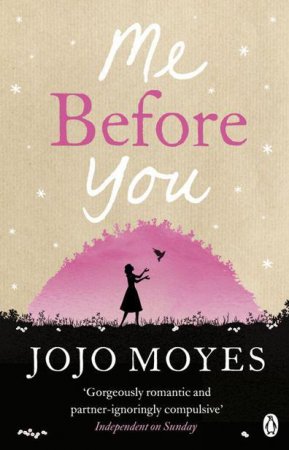 Me Before You
Me Before You After You
After You The Last Letter From Your Lover
The Last Letter From Your Lover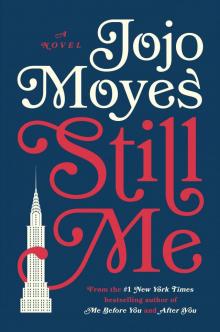 Still Me
Still Me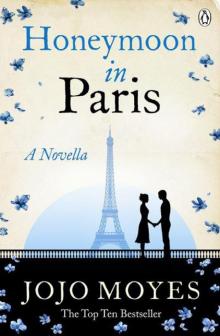 Honeymoon in Paris
Honeymoon in Paris Night Music
Night Music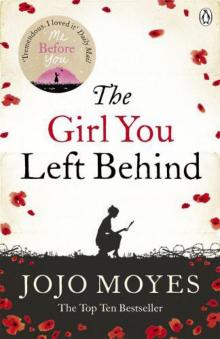 The Girl You Left Behind
The Girl You Left Behind Windfallen
Windfallen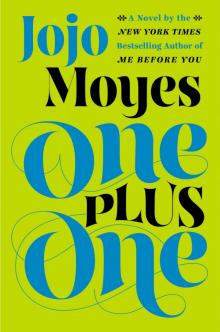 One Plus One
One Plus One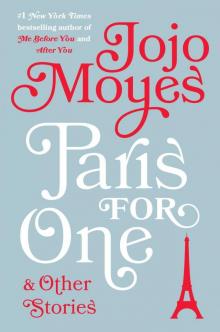 Paris for One and Other Stories
Paris for One and Other Stories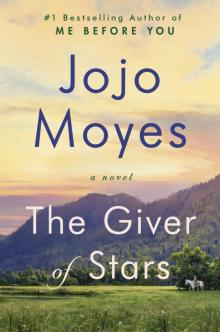 The Giver of Stars
The Giver of Stars The Ship of Brides
The Ship of Brides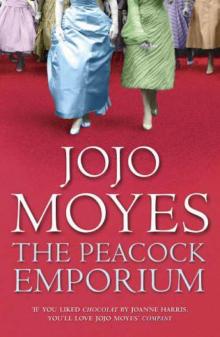 The Peacock Emporium
The Peacock Emporium Silver Bay
Silver Bay The Horse Dancer
The Horse Dancer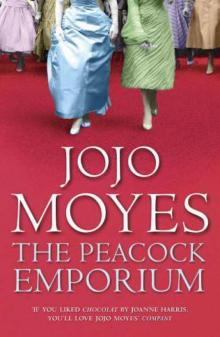 Peacock Emporium
Peacock Emporium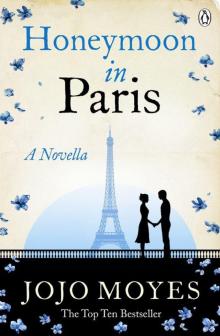 Honeymoon in Paris: A Novella
Honeymoon in Paris: A Novella Ship of Brides
Ship of Brides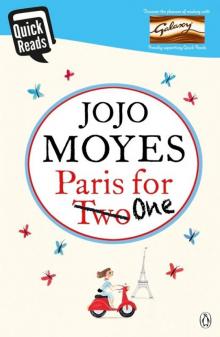 Paris For One (Quick Reads)
Paris For One (Quick Reads)